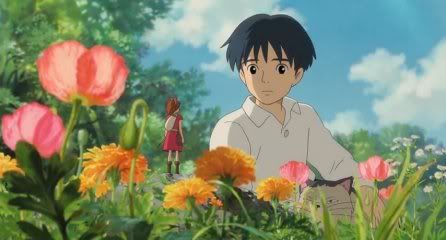The world is a dangerous place for a Borrower.

Studio Ghibli's The Secret World of Arrietty was released in Japan in the summer of 2010, but for some reason we only just got it here in the States last weekend. (If it had come out before the end of the year, I'm certain that either Kung Fu Panda 2 or Puss in Boots would have gotten the boot to give it a slot in the Best Animated Feature race.) Directed by Hiromasa Yonebayashi, making his debut after working in some capacity on most of the studio's output from Princess Mononoke onward, The Secret World of Arrietty is one of several screen versions of Mary Norton's novel The Borrowers, the last of which was a live-action feature from 1997. This time the task of adapting it fell to Hayao Miyazaki (who also oversaw the production) and Keiko Niwa, with Karey Kilpatrick handling the English-language version. Together with a veritable army of animators, they conspired to make one of the most charming, beautifully drawn films I've seen in some time.
Unlike 2008's Ponyo, which leaned pretty heavily on its environmentalist message at times, Arrietty is content simply to immerse us in the world of a family of Borrowers living under a house and let audiences sort out the message for themselves. Our two entry points are the feisty 14-year-old title character (voiced in the American dub by Bridgit Mendler) and sickly human "bean" Shawn (David Henrie), who's spending a week convalescing at his mother's childhood home before going in for heart surgery. Shawn's parents are out of the picture (and divorced to boot as we learn from one conversation between his aunt and her maid), but Arrietty's are front and center (and voiced by real-life husband and wife Will Arnett and Amy Poehler) and have instilled in her an inherent fear and mistrust of all humans. Arnett has also passed on his resourcefulness, which comes in handier than Poehler's hysteria, especially when their home and hearth are threatened by Hara the maid (Carol Burnett), who's the closest thing we get to a villain in the entire story.
It's refreshing to note that the film doesn't rely on frenetic action to amp up the drama. Sure, they have run-ins with cats, insects and birds, but most of the time Arrietty and her father go out of their way to avoid confrontation. (That's what comes of a life where one seeks to avoid being noticed at all costs.) And when she and Shawn interact, the emphasis is on his eagerness to help, not harm her and her family. He's also rather stoically resigned to his own mortality, which is an unusual theme for a family film but it's well-handled. I don't know what it is about the children in Studio Ghibli films, but they just seem better all around at coping with adversity than their American counterparts.